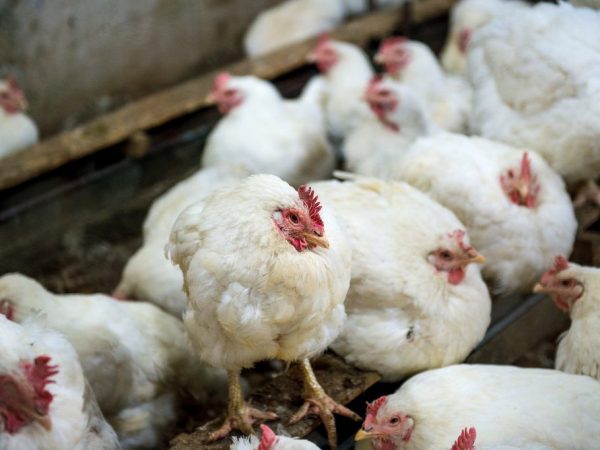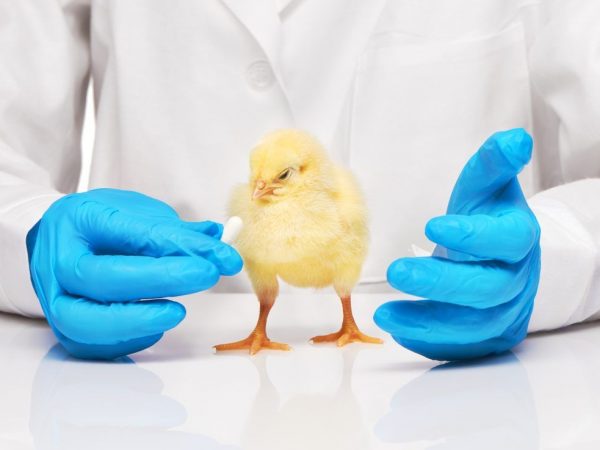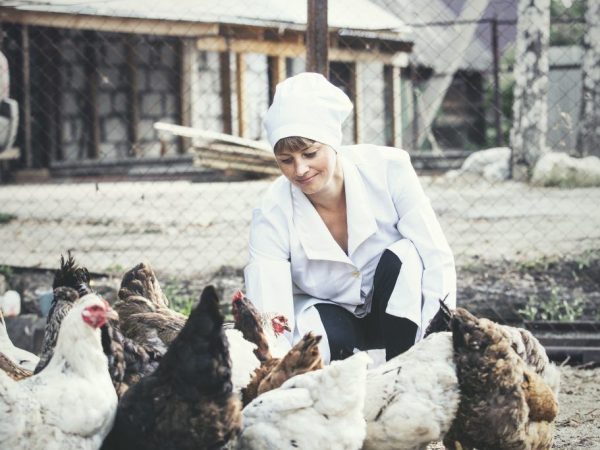Treatment of infectious bronchitis in chickens
Infectious bronchitis in chickens is one of the most common diseases. The disease affects birds of various ages. The main symptom of the disease is coughing. Infectious bronchitis in chickens is accompanied by damage to internal organs, which affects the rate of egg production.

Infectious bronchitis in chickens
Definition
Infectious bronchitis in chickens is a contact disease characterized by damage to the respiratory and reproductive system, which leads to decrease in egg production or a complete loss of the ability to reproduce, and is also accompanied by nephritic syndrome.
Incubation material from infected chickens must not be used to increase the population. If birds become infected at the beginning of puberty, performance remains low throughout the life cycle. When infected in the middle and at the end of the egg-laying period, there is a sharp decrease in the amount of production. About 30% of chicks that have undergone the disease are discarded due to developmental pathologies.

Infectious bronchitis can lead to decreased egg production
Today, scientists have investigated and described about 30 strains of infectious bronchitis in chickens. It progresses rapidly in embryos and amniotic fluid. The maximum number of pathogenic microorganisms is observed 2-4 days after infection. Infected embryos begin to lag behind in development.
Pathogenetic picture
Infectious bronchitis of chickens most often affects young animals up to 30 days, as well as chickens during puberty, at about 5-6 months of age. IBV is the most dangerous virus. Just a couple of days after the infection of one individual, a general epidemic is observed among the entire herd. First of all, bronchopneumonia affects chickens, and only then adults. Sources of infection are:
- infected individuals;
- treated bird.
The virus lives in the body of a sick individual for up to 12 months, is transmitted with feces, mucus secretions, as well as eggs of sick individuals. The spread of infectious bronchitis in chickens is most often associated with a violation of breeding standards when infected hatching eggs enter the chicken coop. The virus is found in eggs only 2-43 days after infection.
The course of the disease will depend on:
- the ratio of chickens of different ages on the farm;
- the physical condition of the chickens at the time of infection;
- the presence of other diseases in birds.
Infectious bronchitis of chickens becomes chronic in farms where there are frequent outbreaks of the disease. The disease is episodic only in new farms. The incubation period is 18-20 days. During the first 3 days, the mucous membranes of the respiratory system are affected. Within a week, the mucous epithelium swells greatly. Outwardly, this manifests itself as an abundant discharge of purulent exudate and mucus.
From 12 to 18 days, the condition of the bird improves slightly, the mucous epithelium takes its previous shape. Complications can be caused by pathogenic microflora. Also, the course will depend on the dose of the virus that entered the body of the birds.
Symptoms
To find the right treatment, you need to be able to recognize the symptoms of the disease in time. It is customary to single out 3 main ones:
- respiratory;
- nephrosonephritic;
- damage to the reproductive system.
The first symptom is most commonly seen in chickens. Already after a day, there is a depression, lethargy, shortness of breath, wheezing, copious secretion of mucus. Young animals eat little, become inactive, try to huddle closer to heat sources. Chicks 2 weeks of age often have a high mortality rate due to mucus suffocation. After suffering a disease, most individuals show a slow development or a complete cessation of growth.
In adults, bronchitis is accompanied by damage to the reproductive system. A week after the virus entered the body, a significant decrease in egg production is noted, which is not restored. Layers who have undergone the disease lay eggs with defects. Some strains cause symptoms such as damage to the kidneys and ureters. Bronchitis proceeds in an acute form, accompanied by loose stools with an admixture of urine, depression, the respiratory symptom is indistinct.
During pathological studies in the lungs of dead chickens, numerous hemorrhages, purulent exudate are found. For adult birds, a characteristic feature is underdevelopment of the ovaries and appendages. In many cases, chickens begin to lay eggs with a bloom that resembles hardened lime in structure, less often with a soft and thinned shell. In 20% of cases, a diphtheria mass is secreted in the yolk. Dystrophy of tissues is revealed on the liver and kidneys. The urinary canals are full of urine. With a complicated form of chicken bronchitis, infiltration and proliferation in the lungs is revealed.
How to identify the disease yourself
Preliminary diagnosis is carried out on the basis of external episodic signs, symptoms and pathological data. Scrapings of the mucous epithelium are taken from killed chickens. The biomaterial is boiled until large pieces are deposited, and the liquid is used for virological research. The collected broth is injected into several embryos and 5-6 juveniles at the age of 10-20 days. A positive reaction will show the symptoms of chicken bronchitis in a day.
Diagnostics involves the exclusion of other similar virological diseases, such as tracheitis, smallpox, pseudo-plague, mycoplasmosis, influenza, hemophilia, laryngotracheitis. Diagnostics of blood serum in ELISA, RNGA, molecular and biological analysis using PCR is carried out.
How to cure
After a complete diagnosis has been carried out and the diseased individuals have been identified, the veterinarian prescribes specific treatment with antibacterial drugs. In case of infectious bronchitis, all infected birds must be isolated from healthy birds. They begin to treat chicken disease antibiotics with tilan in the composition. Antiviral drugs are used in complex therapy.

Diagnosis and treatment of infectious bronchitis in chickens
A chicken coop is also necessary treat with disinfectants... It is best to evict all the livestock for a while and completely wash the room out of the hose, and then carry out the treatment with pest controllers. If there is a high mortality among the entire livestock, it will be necessary to slaughter the remaining individuals. In chronic bronchitis, mass slaughter of livestock is also carried out.
It is important to remember that even a treated bird remains a carrier of infection, so there is practically no point in treating birds. It is better to think about how to dispose of the carcasses of slaughtered birds using a bloodless method and save the surviving livestock.The remaining pestles are sealed with antibiotics and preventive therapy is carried out.
Preventive measures
Particular attention should be paid to incubators, which should not be allowed to enter contaminated biomaterial. It is undesirable to use incubation material from individuals who have already been ill. All healthy birds in and around outbreaks should be vaccinated. Deworming is carried out 2 weeks before vaccination.
If the tendency of infection is observed among young animals, the temperature in the hen house is increased by a couple of degrees, and excessive crowding is also eliminated. In such chicken coops, it is very important to observe thorough hygiene and handle all used equipment, as well as the room itself. The barn should be warm and dry, with good ventilation... You need to change the bedding daily, removing all waste products, and not use chicken manure as fertilizer, but dispose of it.
Vitamin-mineral complexes are added to the compound feed; a weak solution of potassium permanganate is used for drinking. It is prohibited to export meat and egg products from dysfunctional farms. Once a week, the entire farm should be treated with 3% alkali with 1% formalin. Chickens are vaccinated from the first days of life. Revaccination is indicated once a month. It is important to comply with all conditions and carefully select the dosage, otherwise you can provoke the appearance of symptoms of the disease.
Final part
Chicken infectious bronchitis, like any viral disease, is very difficult to treat. The infection spreads very quickly among the entire livestock, and it affects not only young animals, but also adult birds. The symptomatic picture in individuals of different ages will be different. Basically, infection occurs due to non-observance of hygiene rules in the chicken coop and violations of sanitary standards when purchasing incubation material. The virus most commonly infects chickens up to 20 days of age.
In young animals, the respiratory symptom generally progresses: the mucous membranes of the respiratory system swell, there is abundant mucus secretion, conjunctivitis, bronchospasm. Most juveniles die from fluid overflow and multiple hemorrhages. The next virus infects hens at the age of puberty (5-6 months). In this case, there is a slowdown in the development of the ovaries and appendages.
In many adult birds, nephrosonephritis syndrome is observed, which is accompanied by overflow of the ureters with urine. Among the symptoms, diarrhea mixed with urine is observed. Respiratory syndrome with kidney damage is very mild. In all birds, a deterioration in general condition is observed: weakness, low activity, lack of appetite.
Chicken viral bronchitis is very difficult to cure. Even after undergoing an antibacterial course of treatment, the bird remains a carrier of the virus for a long time, therefore it is more expedient to exterminate all diseased representatives, to get rid of the carcasses by a bloodless method. Non-ill pestles are sealed with antibiotics, vitamin and mineral complexes are added to food, all dishes for eating and drinking are pre-disinfected each time. During the period of danger of infection in the hen house, optimal climatic conditions must be maintained. The litter on the floor should be changed daily, carefully removing faeces.
In order to prevent infection and not to know what bronchitis in chickens is, it is necessary to carry out timely vaccination of the entire livestock. Chickens are vaccinated from the very first days of life. Revaccination is carried out every month. The diet should be balanced with a sufficient content of vitamins, minerals, and most importantly - calcium. Disinfection should be carried out weekly throughout the farm to prevent the spread of infection and contamination of other animals.


